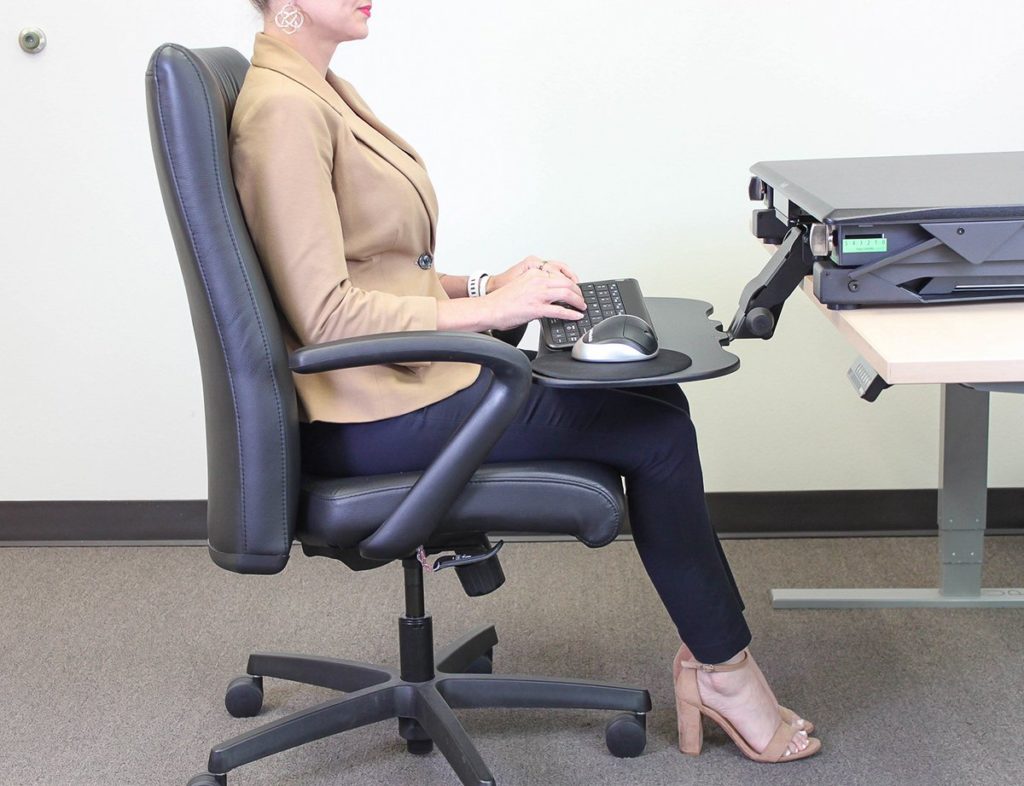Studying for an exam can be truly challenging for the body, not just for the mind. Being in an unnatural position for hours at a time can truly take a toll on your overall health. This is why it is necessary to remind yourself often to sit upright. Bending forward may seem like a good idea, but this way of sitting will result in back pain that you won’t be able to deal with later on. Here are some of the most important tips for the proper positions when studying.
1. Choose the desk and the chair wisely

There are many students who prefer to study lying down. However, this isn’t the best idea, we have to say. This position will only make you sleepy and your thoughts will wander. Even if this may be good for your back, it will steal many hours of your time, prolonging the studying process significantly. Instead, choose a good chair and a desk where you will sit with a completely straight back. The distance between the eyes and the computer, if you are using it, should be 76cm. Make sure that your shoulders are relaxed, otherwise, you will start having headaches pretty soon. This is certainly something to avoid. If you are not sure you can stay in a proper position, use a posture corrector. You can find one here 10boars.
The chair should have a feature for adjusting height, so you can ensure that the position you are in is the correct one. Always keep in mind that your back should be supported. If you don’t feel the chair with your entire back, you need to correct your posture a little bit more. Armrests are not required, but it is definitely recommended to have them since it will help you rest your shoulders, elbows, and forearms. Your feet should be flat on the floor.
Avoid taking unnatural positions because you probably won’t notice how long you have been taking it which may result in pain after a while. The hips and knees should be on the same level, so make sure you are aware of the position you are taking. In addition, it is necessary to free your space from clutter. Not only this will enable you to sit correctly, but it will also significantly impact the way you feel. Being surrounded by clutter can make you pretty tense, so it is something to avoid.
2. Finding the right position for the screen

Placing the screen at eye level is optimal and it will prevent being in any curved position. When it comes to studying long hours, taking care of your back is of the utmost importance. Any pressure on your back will result in learning difficulties, pain and discomfort. The length of an arm is the perfect distance that you need to strive to. Also, if you tend to open multiple windows and compare PDFs, perhaps it would be a good idea to invest in a large monitor, so you don’t have to use two. Assess what suits you the most.
3. Take breaks

Studying for hours is not easy and can even be counterproductive. Instead, take breaks every half an hour and go for a walk. That can be a walk around the apartment, to take a glass of water, look at the window or simply for a quick breathing exercise. Your eyes can get easily strained, so take a few minutes to give them a chance to rest, so you can continue later on. Get familiar with the eye relaxation technique and do it frequently. It will help you preserve the health of your eyes and your sight.
Every little thing you can do to avoid feeling exhausted after studying is worth your time. Learn to use your time productively and plan your time well. You can even use a time management tool to make sure that you planned all the activities well and managed to stay on track. Use the advantages of numerous apps on the market and help yourself be more efficient.
4. Do Yoga

Exercises are the main way to protect your spine from suffering damage because of the prolonged hours of incorrect posture. Not only you will help your muscles relax, but your concentration will improve as well. It will clear your mind and help you regain energy and focus, so you can memorize the study material quicker. Yoga is known for its numerous benefits and many people around the world love it. Integrate yoga exercises into your daily routine and you will see many improvements in your posture, the strength of your muscles, your concentration and the stress level. Start slow, even 10 minutes a day can help you withstand the exhausting studying process.
5. Check the lights

In order to prevent the strain on your eyes and constantly leaning forward to read, you need a lot of light. The best thing is to avoid working with just a lamp. It is always better to have plenty of light in the room. Also, make sure that there is no sunlight anywhere on the screen because this can also be very problematic. If you constantly strive to avoid the sunlight, you will end up with a headache for sure. Find some optimum light level that will help you feel comfortable and help you to read effortlessly.
These were the main tips for proper posture when studying. Keep in mind that you need to monitor your position and correct it consciously. Set frequent reminders for taking breaks and also don’t forget to eat properly. You can find some other study tips in this article. When our basic needs are met, our muscles are relaxed and we are able to provide better results.
On the other hand, being hungry or tired while studying may just prolong the process. Study when you feel rested and fully concentrated. Try to study standing up from time to time. That will help you keep your mind fresh and simply help your back to rest. Your blood flow will improve as well.














